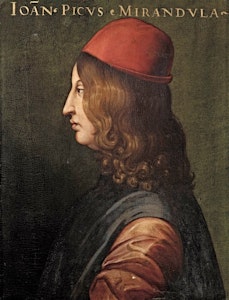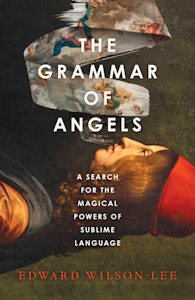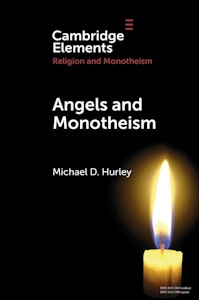Like Lucifer, Pico thought himself too brilliant to stand below angels in God’s Hierarchy
This article is taken from the March 2025 issue of The Critic. To get the full magazine why not subscribe? Right now we’re offering five issues for just £10.
Fra’ Angelico (1395–1455) painted the Annunciation more than once. When we imagine the archangel Gabriel, and his announcement to the Virgin Mary that she would conceive and bear a son, our idea of how that scene should look has a lot to do with Fra’ Angelico’s powerfully lucid compositions.
Yet the most supreme painter of angels is surely Sandro Botticelli (1445–1510). The ones he shows us in his Madonna of the Magnificat (1481) and Madonna of the Pomegranate (1487) in the Uffizi Gallery in Florence seem too beautiful to be human.
St Thomas Aquinas once said that angels need bodies not for their own sake, but for ours. After all, they are “above” matter, and free from any essential relation to it. Botticelli is one of the only painters who seems to have thought hard about how to depict these creatures that seem to us mere mortals to be pure intelligences.

His angels are androgynous in a way that did not appear innocently sexless, at least in the eyes of certain Victorian-era aesthetes in Oxford for whom art often amounted to a means of releasing pent-up emotion and frustrated urges. But Botticelli was perfectly capable of representing straightforward sexual attraction.
When he painted angels, he was not merely using them as symbols, metaphors or projection screens; nor was he freely inventing visions of his own creation. He was trying to depict beings that were real, perfect, beautiful and supremely intelligent, but could not be seen.
In the Jewish, Christian and Islamic traditions, an angel is a messenger from God. If you believe in angels, you believe in God, although the converse does not always seem to be true for a variety of reasons. Modern clergy and divines are often embarrassed by angels; like Tory politicians, such churchmen let themselves be defined by their enemies, then dimwittedly wonder why they have become so impotent and ineffectual. But there is no getting around the presence of angels in the Bible. Sometimes, in the Psalms or the Old Testament, mentions of angels could potentially be reduced to a manner of speaking, where (for example) a “host” or army of angels might look merely like a representation of divine power. The problem is, you cannot always rationalise them away.
In the first chapter of the Gospel of Luke, the archangel Gabriel appears twice to announce the upcoming births of John the Baptist and Jesus, and also strikes John’s father dumb. In the second chapter, an angel announces the Saviour’s birth to terrified shepherds and is followed by an entire army of them, who loudly praise God. In the book of Acts, angels get both the Apostles and Peter out of prison. Could a mere symbol or emotional projection enact a jailbreak?
None of this is a problem for non-believers, of course. For believers, on the other hand, any sophisticated-sounding attempts to appease the demands of secular, atheistic, scientistic materialists and explain them away are simply cowardly and foolish. Either you believe in something, or you don’t. Painters and poets understand this; why don’t theologians, or Christian philosophers?
Angels — if they exist — were not created as competitors for glory against humans
Not all believers are this wet. Some of those who are not will find other stumbling-blocks to damage or scramble their beliefs — intellectual pride, for example. Edward Wilson-Lee’s The Grammar of Angels is a wondrously entertaining introduction to the life and thought of Giovanni Pico della Mirandola (1463–1494), who got into hot water when he decided to devote his extraordinary intellectual energies to philosophical and theological questions surrounding the nature of man and his relationship to the angels.
In Pico’s eyes, the human quest for knowledge could lead men to become like angels or even surpass them. Despite his overheated rhetoric, he meant what he said quite literally, and challenged thinkers who doubted his claims to debate him publicly. Yet he never had the impact on civilisation he ought to have had. In the end, Pico’s greatest contribution to intellectual history was to write the first printed book ever to be banned by the Catholic Church.

For all that, Pico was no mere braggart. He was one of the most charismatic and impressive figures at the court of Lorenzo the Magnificent in Florence, and a great lord in his own right. According to legend, he was handsome, charming and brilliant. He was also prodigiously learned, thanks to a photographic memory, a restless mind and a freakish gift for languages.
His love life was perhaps less dashing. Pico channelled his passion into his work, except on the occasion when he took 20 armed followers to Arezzo to kidnap the wife of a local merchant — the attempt was thwarted, and 18 of his followers were killed. Then there is that curious anecdote about an unnamed friend of his who was unable to become sexually excited unless someone beat him with a vinegar-soaked rod until he bled.
Pico ended up giving away his enormous fortune and became a follower of the ascetic religious reformer Girolamo Savonarola (1452–1498), whose turbulent career and fiery death ought to be the subject of Wilson-Lee’s next book, unless he chooses instead to write about Flavius Mithridates (1445–1489), the most enchantingly disreputable intellectual conman of the Renaissance.
Wilson-Lee tells the story of Pico’s life with admirable sprezzatura, scarcely breaking a sweat as he demonstrates his command of subjects ranging from Plato’s philosophy to the mysteries of the Kabbalah. It is a pleasant shock to realise that he is a newcomer to the study of Florentine humanism, since he writes about the subject far more convincingly than many credentialled experts currently do. His is by far the best book on Pico since Brian Copenhaver’s magisterial Magic and the Dignity of Man (2019) — and The Grammar of Angels is arguably even more fun to read than Copenhaver’s book, which is saying something.
If Wilson-Lee has a blind spot, it might involve the Christian elements in Pico’s story. Pico’s form of intellectual thrill-seeking only seems reckless and irresponsible if you consider heresy to be a bad thing — and to a Christian it seriously is because it damages the very unity that Pico was trying to strengthen.

All the same, Wilson-Lee is alert to the dangers of literary and philosophical self-indulgence, and the power of words and ideas to degenerate into mere intoxicants. Socrates once described sexual attraction as evidence of the soul’s desire to leave the body behind and rise up to the heavens where it belonged; but passions and ecstatic sensations do not necessarily lead us heavenwards.
The Grammar of Angels is usefully complemented by Michael Hurley’s sparkling, cheekily combative little pamphlet Angels and Monotheism. In less than 60 pages, Hurley defends the science of “angelology” from the point of view of an unapologetic, nimble-witted, open-minded yet solidly orthodox Catholic. Although the prose seems breezily readable, the text has density and weight, and rewards close study. Hurley reminds us that the simple act of entertaining the possibility that angels are real has profound, far-reaching implications.
If only Pico had read something like Angels and Monotheism. It might have saved him a great deal of effort and suffering had someone quietly reminded him that angels — if they exist — were not created as competitors for glory against humans: instead their role in the universe, as far as we are concerned, is to turn us towards God.
Saint Augustine notes that “angels” who encourage you to worship themselves, and/or yourself, are in fact demons. Like Lucifer before him, Pico thought himself too brilliant to stand below angels in God’s hierarchy. At least he (grudgingly) accepted correction. Wilson-Lee reminds us that without inspiration, we have no culture or civilisation; Hurley, like Botticelli, reminds us this inspiration can only come from above.







